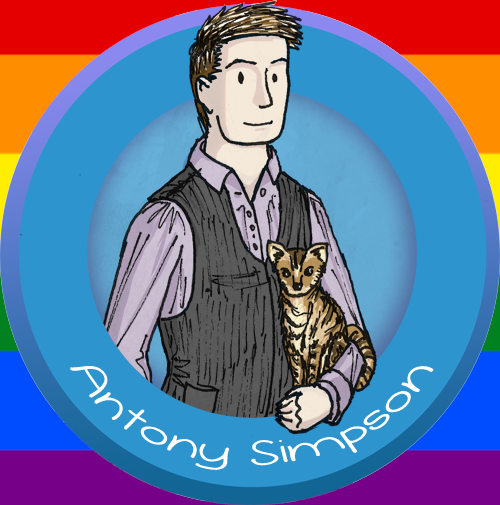 Inkwell & Quill. (Image Copyright: Sye Watts/Antony Simpson.) |
This is the third and final part in a blog post series, where I’ll be sharing some of what I’ve learned about creative writing over the last few years. The first blog post in the series was Creative Writing: Beginning and the second blog post in the series was Creative Writing: Middle.
1. Carry a Notebook for Ideas |
2. NEVER Delete Anything
Never delete anything that you write. Save everything. One day, you might want to go back to it. Even if you don’t continue where you left off, but instead start the creative work again with a completely different angle. You’re going to need the original beginnings.
3. Editing Checklist
Most writers spend more time editing than they do writing. It is advisable to click Save As… and save another version of your work with every edit, so that if you want to go back you can. Here’s my editing checklist:
![]() First Read Aloud. Any sentences that you struggle to read or make sense of usually need further work.
First Read Aloud. Any sentences that you struggle to read or make sense of usually need further work.
![]() Check for appropriate use of capitalisation, commas, semicolons, full stops and speech marks.
Check for appropriate use of capitalisation, commas, semicolons, full stops and speech marks.
![]() Check for typos.
Check for typos.
![]() Grammar and Spelling Check.
Grammar and Spelling Check.
![]() Cut Overwriting & Repetitions.
Cut Overwriting & Repetitions.
![]() Re-write sentences that don’t make sense or are unclear.
Re-write sentences that don’t make sense or are unclear.
![]() Second Read Aloud. Any sentences that you struggle to read or make sense of usually need further work.
Second Read Aloud. Any sentences that you struggle to read or make sense of usually need further work.
![]() Consistency Checks: Tense, Perspective, Description, Characters and Plot.
Consistency Checks: Tense, Perspective, Description, Characters and Plot.
![]() Consider plot and pacing. Are there any plot holes? Is the pacing of scenes, chapters or even the whole work to slow, to fast or about right?
Consider plot and pacing. Are there any plot holes? Is the pacing of scenes, chapters or even the whole work to slow, to fast or about right?
![]() Third Read Aloud. Any sentences that you struggle to read or make sense of usually need further work.
Third Read Aloud. Any sentences that you struggle to read or make sense of usually need further work.
![]() Put the work away for a few weeks, then go back to it and start the editing checklist again. A break from a creative project gives you distance and allows you to spot mistakes or problems that you didn’t see in the original writing or editing stages because you were to close to the work.
Put the work away for a few weeks, then go back to it and start the editing checklist again. A break from a creative project gives you distance and allows you to spot mistakes or problems that you didn’t see in the original writing or editing stages because you were to close to the work.
Here is another more technical editing checklist: Grammar Girl’s Editing Checklist.
4. Reader Feedback
Reader feedback is great. But you have to be open to any constructive criticism about your creative work. If you ask friends or family to read your work, ensure that you have a relationship with them that allows complete honesty. Ensure that this honesty doesn’t damage your relationship. I read a good friend’s creative work on a regular basis, as he does mine, and we are completely honest in our feedback. We can do this because we both know that the feedback we give and receive is given with kindness, and is aimed at helping one another to create the best work that we can.
You should always appreciate and appraise reader feedback from any source. Appreciate that someone has taken the time to read your work and give feedback. People who give feedback are often working on their own creative projects. They have taken time out of their creative work to give you feedback on yours.
You don’t need to agree on all the points that they raise, or change everything that they suggest needs changing. You are the creator of your own work, so use your own judgement. But consider the feedback, especially if you are getting the same feedback from several different sources.
Some Writers come together in local Writers groups to get feedback on their creative work. These days there are probably some Writers groups online. Some Writers find these groups useful, others don’t. The best way to see if this works for you is to give it a try.
5. Publishing Options
You can send your work to agents and publishers. To the larger presses or smaller independent ones. You can self-publish on Amazon and even get your self-published printed on demand (POD). I don’t have loads of knowledge about publishing or the experience to advise. All I would say is people with little or no experience manage to get their work published all the time.
6. Promoting Your Work
Some great ways to promote your work include:
- Get a good book cover designed. Book covers are the first thing people see about your work. A good book cover design can make the difference between people buying your creative work or not.
- If you’re writing the blurb on the back cover, make sure it is written in a way that sells your creative work.
- Use social media. Facebook, Twitter, goodreads and Instagram as a minimum.
- Approach appropriate bloggers, vbloggers and ask them to read & review your creative work.
- Send copies of your work to appropriate News Paper Entertainment Columnist, Magazine Writers, other Authors, etc. requesting they read & review your work.
- Attend literacy events and be involved with the literacy community (both locally and online).
- Do interviews with anyone that is willing to interview you.
- Try and be in the Media: TV, Radio, News Papers & Magazines. Even if it isn’t directly about your creative work, you’d be surprised how many people will see, hear or read what you say/write and go on to seek out your creative works.
- Do readings.
- Contact local libraries, book stores, etc and arrange signings and/or readings.
- Encourage people to write Amazon Reviews.
- Have a book Giveaway – people love the opportunity to win something.
- Hire a Marketing Company, there are many out there that specialise in the PR and marketing of books.
7. Some Great Books About Creative Writing & Publishing
Write soon,
Antony

